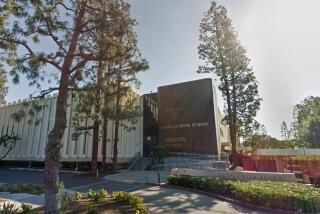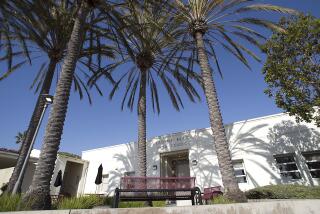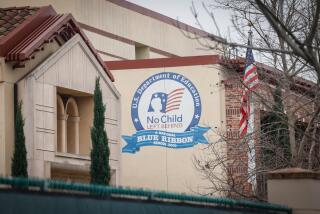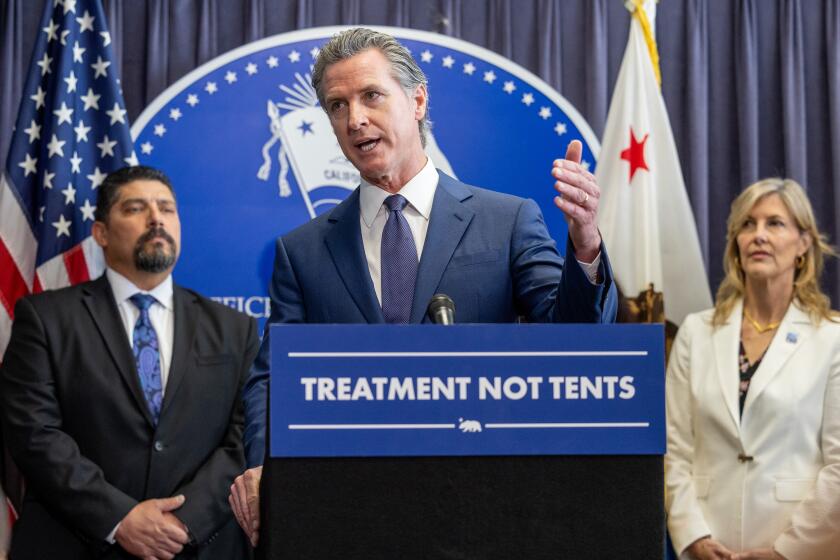White students rapping a racial slur stirs posh Brentwood School
A brief video of mainly white and male teenagers loudly rapping along to a song peppered with the N-word has stirred anger and discomfort among students and celebrity parents at one of Los Angeles’ most expensive private schools.
In the video, the young people, at least some of whom are students at Brentwood School, rap along with lyrics that boast in explicit terms about having intercourse with, and receiving oral sex from, another person’s girlfriend.
Many are wearing Hawaiian shirts as they preen for the camera, and sing along to “Dump Dump” by A$AP Ferg, mimicking the street-tough posturing in many hardcore rap videos.
Apparently shot on a yacht, the video wound up on a student’s Snapchat account.
Students at the school saved the video of the Saturday night party and sent it to the Brentwood School’s administration the next day.
See the most-read stories this hour >>
A student then posted it to YouTube, adding text meant to ironically reflect the school’s stated commitment to diversity, said Max Whinlock, a sophomore who is African American.
The same student got together with at least one other classmate, Max said, and created a change.org petition demanding action from the school under the group name “BWS Students Against Racism.”
Former baseball player Barry Bonds, whose daughter attends the school, saw the petition and posted it on Facebook and Twitter.
“I am sad that i had to see this at my daughters school. #Racism #Fixit #Suspension,” Bonds wrote.
The petition, though vague about what action it is demanding, garnered almost 500 supporters by Wednesday afternoon, prompting emotional discussions among students, according to some minority parents and a black student at the school.
The school also held meetings with each grade Tuesday to talk about what happened, and teachers will hold discussions Thursday, according to a letter the school administration sent to parents.
The school is investigating and addressing the incident, the school’s head of advancement, Gennifer Yoshimaru, said in an email.
“The school generally will not address off-campus misconduct that does not directly affect the school, but it reserves the right to get involved and even to impose discipline in appropriate cases, which is what we’ve done in this situation,” Yoshimaru said.
She did not say what disciplinary action would be taken.
Max, who was not at the party but saw the video, said he wasn’t surprised that the students sang the song.
Broadcasting it on Snapchat, however, glorifies the misogyny in the song and use of the N-word, he said.
His father, Phil Whinlock, said he didn’t judge the students for singing the song or using the incendiary racist term whose prevalence in hardcore rap lyrics and by non-African American rap fans has stirred national debate recently.
But he said he couldn’t believe that the students were “arrogant enough to pass it around. ... I can’t believe they put that online. I can’t believe they videotaped it.”
Max said his classmates occasionally use the N-word to express anger outside of school -- while playing Xbox, for example -- and that he has explained to them why the term is inappropriate and that it discomforts him.
“There’s no overt racism here,” Max said. “It’s about a lack of respect for everybody.”
Both father and son are happy that the school has sent the emails and are talking about the incident with students and parents. They both want to see more diversity on campus and more discussion of racial issues in the classroom.
Jody Armour, a USC law professor who visits schools to discuss race and social justice, said there’s nothing new about white teenagers singing a rap song by a black artist that includes the N-word.
Black people, he said, have more license to use the N-word than white people because white use invokes the word’s history as a verbal assault -- one all too often followed by physical attack.
Blame for the ideas expressed in the misogynistic song, he said, does not rest on the teenagers but on a mass culture that celebrates the objectification of women, a music industry that supports and markets that music to young people, and the musician who performed the song.
But the students do control their actions, and if they are given a better education in the history of racism and misogyny, they might become more discriminating in their choice of music, he said.
Times Staff Writer Richard Winton contributed to this report.
Reach Sonali Kohli at Sonali.Kohli@latimes.com or on Twitter @Sonali_Kohli.
MORE EDUCATION NEWS
How California protects transgender students
Rare letter written by Christopher Columbus is being returned by U.S. to Italy
L.A. school district reaches $88-million settlement in sex misconduct cases at two campuses
More to Read
Start your day right
Sign up for Essential California for news, features and recommendations from the L.A. Times and beyond in your inbox six days a week.
You may occasionally receive promotional content from the Los Angeles Times.







